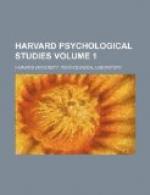[6] Wundt, W.: ‘Physiol.
Psych.,’ 4te Aufl., Leipzig, 1893, Bd.
II., S. 83.
[7] Wundt, W.: ‘Physiol.
Psych.,’ 4te Aufl., Leipzig, 1893,
II., S. 89 ff.
[8] Bolton, T.L.: Amer.
Jour. of Psych., 1894, VI., p. 145 et
seq.
The most elaborate consideration of rhythm yet published is that of Meumann.[9] He avowedly worked out and defended the theory of Wundt. The only important difference is the larger place which he gave to the ‘motor accompaniment,’ although he was always careful to emphasize its secondary and derived character. He insisted that the ’mental activity’ is always primary, and that without it there can be no rhythmization; and he opposed vigorously the motor inclinations of Mach and Bolton. It is certainly unfortunate that rhythm has always fallen into the hands of the investigators of the ‘attention,’ or the ‘span of consciousness,’ or the ‘perception of time.’ It is but an incident that judgments of time are often based on rhythms; and everything that Meumann has said of a ‘mental prius,’ or a ‘synthesizing activity’ in the case of rhythms, may just as well be said in the case of any cooerdinated act.
[9] Meumann, E.: Phil. Stud., 1894, X., S. 249 ff.
Meumann discussed in detail the characteristics of the rhythm of a simple series of sounds, of music, and of verse. He assumed that in the simple sound series we have rhythm in its barest form, and only the rhythmic synthetic activity is at work; while in music there is a content which to some extent prescribes unities, and the objective regularity of the rhythm is broken. In verse we have much more content, and the rhythmization is no longer regular in its temporal relations; it is entirely dominated at times by the ‘logical unities’ of the ‘thought.’




